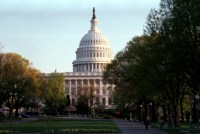Latest KFF Health News Stories
Much of this week’s major health policy news stems directly from Congress’ unfinished business related to the Medicare ‘doc fix’ as well as the House Democrats’ decision not to include enhanced Medicaid funding and COBRA benefit subsidies in their sweeping jobs bill.
COBRA Subsidy Starts Running Out For Some As Congress Grapples With Extension
The proposal to extend COBRA subsidies to those laid off through the end of the year is languishing in Congress. So the unemployed may soon pay more to remain on COBRA, look for insurance on the individual market, go on Medicaid or lose coverage altogether. And that could further tax a health system already struggling to keep up with the number of uninsured.
Patient Survey: More Health Care Is Better, Despite What Experts Say
A new survey finds that, when it comes to their own health care, most people say “more is better, newer is better, you get what you pay for.” That’s frustrating for experts who say these things are often not true.
Analysis: Anti-Smoking Program Extinguished in New Jersey
Gov. Chris Christie is cutting services and New Jersey’s anti-smoking program in order to reduce the deficit. Other states are feeling the pinch as well.
What The New Health Law Means For You
The law will extend health insurance to 32 million currently uninsured Americans by 2019, and will also have an impact on how nearly every American buys insurance and what insurance must cover.
Transcript: Health On The Hill – June 1, 2010
Bowing to pressure from Democratic fiscal conservatives, House Democratic leaders scaled back health-related provisions in tax extenders legislation the House passed before beginning its Memorial Day recess.
Insurance Industry Faces Tough Scrutiny From Federal Watchdogs
A foursome of longtime industry watchdogs are helping steer the federal government’s effort to overhaul the private insurance market. Karen Pollitz, Steve Larsen, Jay Angoff and Richard Popper have top spots in the newly minted Office of Consumer Information and Insurance Oversight.
Week In Review: Doctor Payment Fight; State Budgets And Medicaid; Medicare Brochure Protests
Challenges from conservative Democrats forced party leaders this week to cut some major spending programs, such as extending COBRA benefits for workers being laid off and providing extra money to state Medicaid programs.
Full Text Of HHS’ Controversial Brochure, “Medicare and the New Health Care Law”
The federal government sent a brochure to more than 40 million Medicare beneficiaries, “Medicare and the New Health Care Law – What It Means for You,” which is generating political controversy.
Sebelius To Employers: Cover Young Adults Now
HHS Secretary Kathleen Sebelius said federal officials are urging self-insured employers to keep young adults up to age 26 on their parents’ health plans before the deadline under the new health overhaul law. Self-insured employers, who pay the medical bills of millions of Americans, in many cases could wait until January to comply with the law.
Some Recent Grads Face Health Care Coverage Gap
With the new health law’s requirement that young adults be able to remain on their parents’ health plans until they turn 26. But when exactly the new benefit begins, who exactly is eligible and who decides all have the same answer: It depends.
Democrats Scale Back Medicare ‘Doc Fix,’ COBRA Subsidy Extension In Jobs Bill
Caught up in the congressional politics swirling around a pending tax bill are proposals that affect health care for newly laid-off workers as well as Medicare and Medicaid patients.
$5 Billion In Federal Funding For High-Risk Pools May Not Be Enough
A new report says federal funding will not cover the insurance needs of all the people who now have trouble getting coverage because of preexisting conditions. But HHS officials disagree with the findings.
Experts Worry: Could Government Loans To Doctors Raise Health Costs?
More than $2.5 billion in government-backed loans to doctors, dentists and other health care providers is helping to stimulate the economy and help patients, but some health experts say the money could increase health costs.
Requiring Doctors To Justify Scans Reduces Waste
A funny thing happens when a computer challenges orders for medical scans that aren’t likely to help diagnose patients: Doctors often drop the test requests.
Transcript: Health On The Hill – May 25, 2010
The House of Representatives may vote on legislation this week that would stop a scheduled June 1 payment cut for doctors who accept Medicare physicians.
Kansas Mental Hospitals Beyond Capacity
The Kansas Department of Social and Rehabilitation Services has suspended voluntary admissions to the state’s three hospitals for the mentally ill because they are full.
Spouses Face Hurdles When Caring For Themselves, Ill Loved Ones
Family caregivers now administer arsenals of medications and undertake procedures, from wound care to dialysis, that were once the province of medical professionals.
Obama’s Health IT Leader Says Doctors Will Embrace Change
David Blumenthal is guiding the deployment of up to $27 billion in federal stimulus money to help doctors and hospitals implement health information technology. Proponents say the shift is critical to achieving goals of medical care quality and cost control.
Week In Review: Honing Political Strategy On Health Reform; Facing Down A Medicare Deadline
Confusion from the primary elections this week punctuated the Obama administration’s progress on implementing the new health law.
















